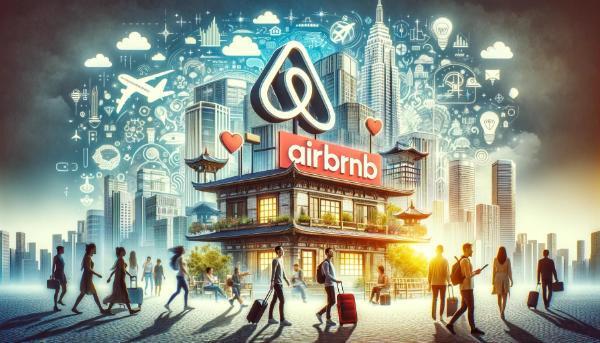Like many other Internet companies, Airbnb has had a radical impact on the way society and economy function. Impact on property prices worldwide and fundamental disruption of the traditional hospitality industry are just two of the many ways that this and similar companies transform society and culture.
One of the least discussed and most profound impacts that Airbnb is having upon the society seems to me is the unprecedented intermixture of cultures that it facilitates; the blending of peoples into a ubiquitous, global culture; an earth-wide civilization.
The whole history of the human species may be seen as a continuous process of forming larger cultures by merging smaller ones. Starting with a few dozens of wanderers who bridled their pride in order to maintain a larger cave and chase down a bigger mammoth, up to a few dozens of states who bridled their pride and founded the UN in order to avoid a nuclear annihilation, humans have shown a sort of mechanical tendency towards ever-increasing inter-combination.
The necessary step preceding every cultural merging is intercultural interactions. For most of history, intercultural interactions were almost entirely dominated by two professionals: merchants and soldiers. Both of them were motivated to interact with other cultures under the same mindset: one that craved material wealth. They only differed in the methods they applied to achieve a common goal. Trade relied on collaboration and war on competition. The former proved rather constructive and the latter rather not quite so.
Other than those two, throughout history, people of several other mindsets engaged in interacting with other cultures: diplomats, adventurers, missionaries, prophets… All of them remained marginal in relation to the merchant-soldier dominating group. And a very few of them were motivated to travel by any other thing than material wealth. All of them together – people who interacted for any reason and to any degree with people from other cultures – were historically but a trifling fraction of the population and were mostly deemed lunatics if they came in contact with other cultures for any other reason than profit.
The merchant-soldier kind lost for the first time their supremacy in performing the intercultural interactions (as well as formulating the public’s beliefs and opinions about other cultures) in the recent decades following WWII. That was the time the astonishing phenomenon of recreation travel, tourism, made its massive appearance, and within no time, by far overtook the merchant-soldier kind in being the world’s major inter-culturally interacting group.
This was an outright astounding, complete reshaping of the reasons that urged people to interact with each other inter-culturally. What was by far more profound than the dramatic proportional shift was the motives that urged that new kind of travelers to travel. Whereas almost the entirety of travelers up to that point interacted with other cultures in a bid to profit, tourists paid money for interacting with other cultures!
Tourism has already had a most fundamental influence on the nature of civilization; notwithstanding the many limitations it’s met on its way to unfolding its potential.
For the most part, tourism has been an interaction of cultures in a very strictly specified way. More than an interaction of cultures, it has actually been an interaction of the developed-world middle-class with tourism-sector workers.
Modern efficiency and the Internet as a whole during its early phase caused a striking growth in the tourism industry by basically increasing the numbers of the middle-class and the tourism-sector workers. But the interaction between the two groups remained almost as exclusive.
Throughout the history of tourism, the average tourist has been confined to a well-defined and pretty limited selection of destinations, where she is confined to exclusively interacting with people who principally regard her as their livelihood.
This type of intercultural interactions has been unequivocally revolutionary for anything that preceded it, but it’s still triflingly as potent for transformation as the new type of intercultural interactions that is currently given birth: free, random interactions: interactions that are not confined to a sell-buy, kill-and-save-yourself, pay-and-be-served, or any other kind of interaction between groups of people with strictly predefined roles and relations… but natural, unrestricted interactions between anyone and anyone.
Many projects, of which one of the most notable is Airbnb, fundamentally transform the way cultures interact with each other. They do that by bringing the cultures in direct contact, excluding the tourism-industry middleman. They draw the tourist out of the resort, the hotel, and the designed-for-tourism area… and into the residential districts! They give the Westerner the choice to live in the most random neighborhood of the most random Chinese city and vice versa! They empower the tourist with the ability to intimately experience the genuine culture of locals in any given area; thus allowing for a steadily increasing number of people living with a steadily decreasing number of biases against other cultures.
It is actually very impressive to notice how rapidly this shuffling of cultures is being played out; how increasingly multicultural the world’s neighborhoods become. Home-sharing algorithms like Airbnb do not, in fact, cause the cultures to intermix; they only empower them to do so. Humans have an instinctive impulse for motility, interaction, and increasing combination between them, which is finally being facilitated on the ultimate degree by home-sharing algorithms. People are given the opportunity to move and live anywhere they want at any time they want; and they eagerly take this opportunity up.
Airbnb alone currently boasts 150 million users who increase exponentially and make use of the algorithm ever more frequently. Where does this lead to? In combination with the distribution hyper-efficiency the Internet has allowed, 3D-printing and other advanced manufacturing techniques are bound to fuse the housing and hospitality industries into a single algorithm accommodating the entirety of roofing needs. A non-scarcity economy is emerging wherein the very concept of property is doomed to be rendered obsolete and sink into oblivion.
In such a world, production will not be merely striving to keep up with demand, but will be automatically matching demand. Coming to any possible place on the planet or beyond, you may not only have the choice to pick out from a virtually endless variety of already available accommodation options, but pretty much instantaneously, and with minimal cost involved, have a 100%-personalized accommodation for you, which might well be simply dismantled after your departure.
In such a world, distinction between locals and foreigners is bound to get steadily fainter until it completely fades. Home-sharing algorithms are giving birth to a truly cosmopolitan civilization: a civilization fragmented into no nations, races, or classes of any sort: a civilization essentially fragmented into no other thing than a number of fully-personally-developed, diverse individuals equaling the world population: a civilization of individuals collectively identifying themselves solely as Earthians.
That will be the most crucial event Evolution has seen on this planet ever since the primordial soup. That will be a sort of a human consciousness soup wherein a radically novel type of Life is going to be nurtured.

